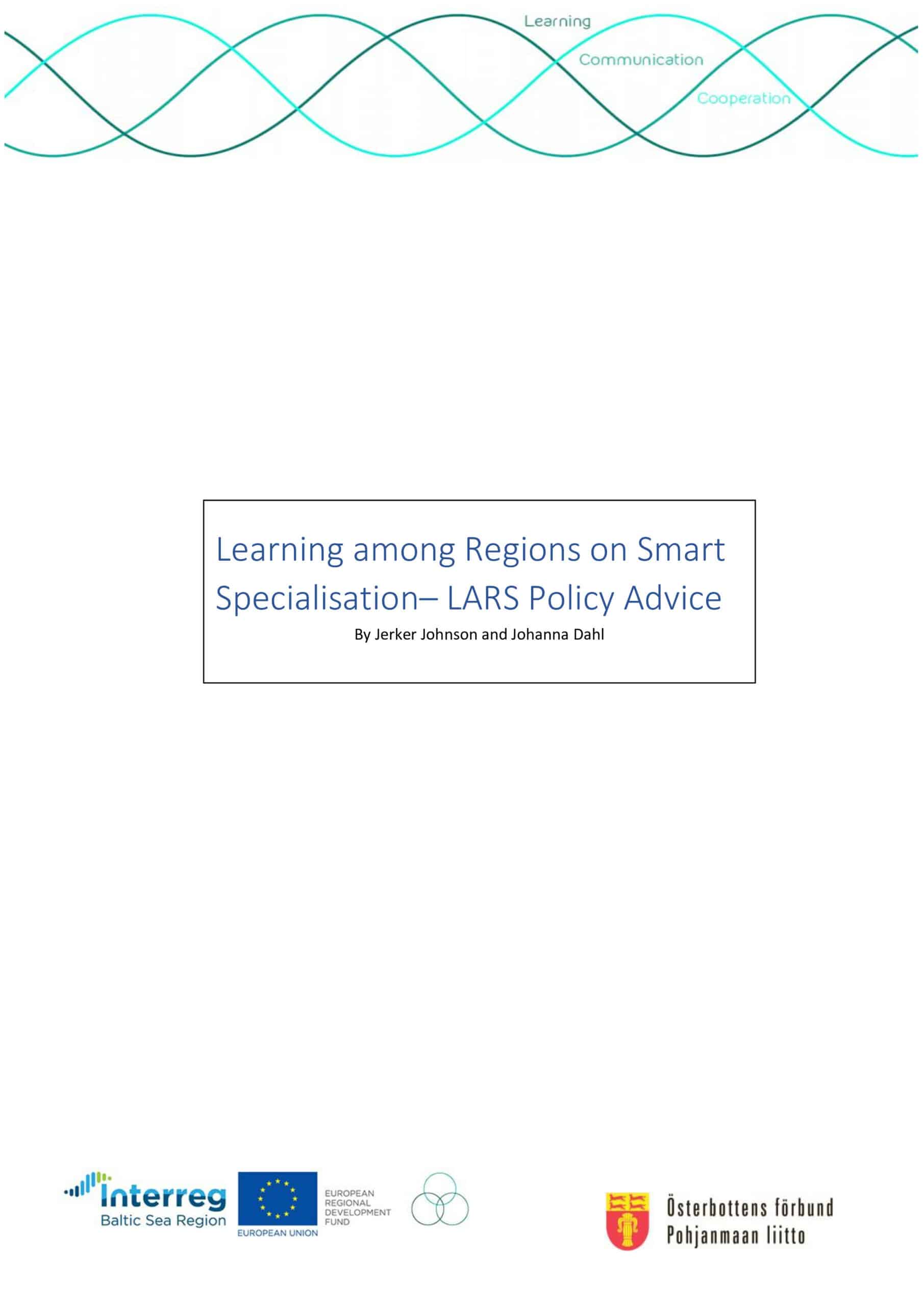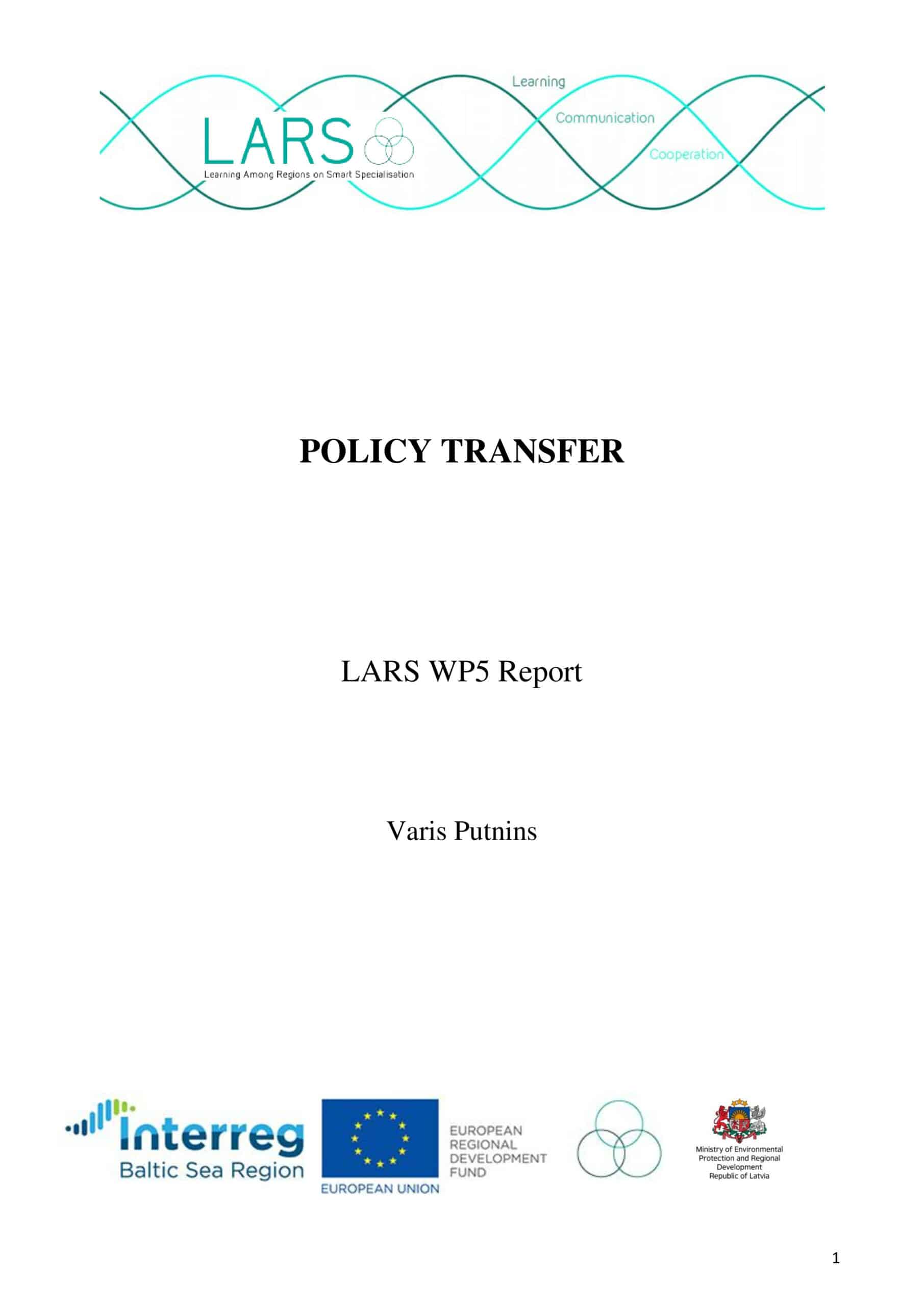LARS
The global value chains and increased sophistication of production constitute a large challenge for regional development efforts. There is a need to learn and upgrade the level of policy intervention. The regional innovation systems are different but may learn from each other through a process of transnational learning. The challenge is to identify and close gaps in regional and transnational systems of innovation. The project LARS is based on the idea that connectivity between stakeholders in regional innovation system is crucial in the entrepreneurial discovery process where companies, universities and public organisations are at the forefront. Next, a collaboration between smart specialized regions could form the base for macro regional strategies.
The project aimed to help the public sector in leading smart specialisation processes in their regions and to connect innovation networks across regions. It helped find solutions tackling the fragmentation of regional systems of innovation looking for entrepreneurial discoveries within blue growth, bio and circular economy, advanced production methods and technologies for energy efficiency.
Budgets
in numbers
-
1.65MillionTotal
-
1.14MillionErdf
-
0.00MillionEni + Russia
-
0.09MillionNorway
Achievements
Strengthened transnational learning
For transnational learning, exchange and policy transfer, the project LARS involved organisations from Poland, Latvia, Lithuania, Germany, Norway, Sweden and Finland. Most of the partners represented authorities with experience in implementing EU regional policies, but also research institutions with a focus on innovation deliverance, as well as non-governmental organisations.
The project partners started by selecting the value chains out of the already existing that played a vital role in the process of the smart specialisation strategies (RIS3) implementation in their regions. Based on this selection, the project introduced a format for value-chain analysis applying Porter´s company-based model and elaborated a methodology to apply in transnational learning. As a case of transnational learning, the partners studied the implementation of smart specialisation strategies. Moving towards a green transformation as required by the European Green Deal was a driver for the development. The format used in the stakeholder analysis (including stakeholder motivation) based on a classification of urgency, legitimacy and power was adopted towards the Sustainable Development Goals (SDGs).
Policy transfer
The project identified potential good practices and challenges for testing possible transfers of policies. Aimed to strengthen the institutional capacity and governance of Smart Specialisation programs through transfers of good practices, the project analysed various methods. A well-developed method in so-called "translation" of best practices is a "learning history approach". This process is organised through networks between specific pairs of regions who "have something to learn from each other", covering interactions on specific policies, strategies of change and mapping of barriers. Among the participating organisations, the project primarily targeted public administrators working with the materialisation of S3. The purpose was changing their approach to more proactive in innovation system planning, specifically rather "owner-perspective" instead of a neutral "enabler-perspective". In general, the improved institutional capacities would open up new and innovative ways of combining and exploiting regional resources leading to growth and regional transformation.
Outputs
Learning among regions on Smart Specialisation - LARS Policy Advice

Report on policy transfer

Project Stories
Partners
Regional Council of Ostrobothnia
- TownVaasa
- RegionPohjanmaa
- CountryFinland
- RepresentativeJerker Johnson
- Phone
- E-Mail
- Web
University of Vaasa
- TownVaasa
- RegionPohjanmaa
- CountryFinland
- RepresentativeSeija Virkkala
- Phone
- E-Mail
- Web
Region Västerbotten
- TownUmeå
- RegionVästerbottens län
- CountrySweden
- RepresentativeJonas Lundström
- Phone
- E-Mail
- Web
Regional Council of Päijät-Häme
- TownLahti
- RegionPäijät-Häme
- CountryFinland
- RepresentativeMarko Mälly
- Phone
- E-Mail
- Web
Hamburg University of Applied Sciences
- TownHamburg
- RegionHamburg
- CountryGermany
- RepresentativeWalter Leal
- Phone
- E-Mail
- Web
Lithuanian Centre for Social Sciences, Institute of Economics and Rural Development
- TownVilnius
- RegionVilniaus apskritis
- CountryLithuania
- RepresentativeZivile Gedminaite-Raudone
- Phone
- E-Mail
- Web
Ministry of Environmental Protection and Regional Development
- TownRiga
- RegionRīga
- CountryLatvia
- RepresentativeAlise Vecozola
- Phone
- E-Mail
- Web
Oppland County Authority
- TownLillehammer
- RegionOppland
- CountryNorway
- RepresentativeErik Lagethon
- Phone
- E-Mail
- Web
Lithuainian Innovation Centre
- TownVilnius
- RegionVilniaus apskritis
- CountryLithuania
- RepresentativeGiedre Stumbryte
- Phone
- E-Mail
- Web
-
Project managerJerker JohnsonRegional Council of Ostrobothia
-
Legal representativeKaj SuomelaRegional Council of Ostrobothnia
-
Financial managerMargot FromRegional Council of Ostrobothnia
-
Communication managerJerker JohnsonRegional Council of Ostrobothia



